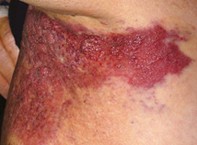Peer Reviewed
Feature Article Oncology
An overview of the management of advanced breast cancer
Abstract
The overall survival of patients with advanced breast cancer is improving, due in part to the increasing range of cytotoxic agents now in use. Communication between patients, specialists and GPs is vital, as is mutual understanding of the disease progress and the treatment goals.
Key Points
- Advanced breast cancer includes locally advanced disease, metastatic disease and cancer recurring locoregionally after previous surgery. Treatment intent is usually palliative rather than curative, with the emphasis on physical and psychosocial wellbeing.
- Locally advanced breast cancer is usually treated with a combination of chemotherapy, radiotherapy, surgery and endocrine therapy. Systemic therapy may substantially reduce the tumour size before local therapy.
- Locoregional recurrence after previous surgery may be treated with further surgical excision and/or radiotherapy for local control. Systemic therapy may prevent or delay systemic relapse.
- Metastatic breast cancer typically requires a combination of anticancer and supportive therapies. Quality of life is important and a key determinant of success of palliative treatment.
- GPs are integral members of the multidisciplinary team because they are often the doctor of first contact and the co-ordinator of care. Communication between patients, specialists and GPs is vital, with mutual understanding of the disease progress and treatment goals.
Purchase the PDF version of this article
Already a subscriber? Login here.

